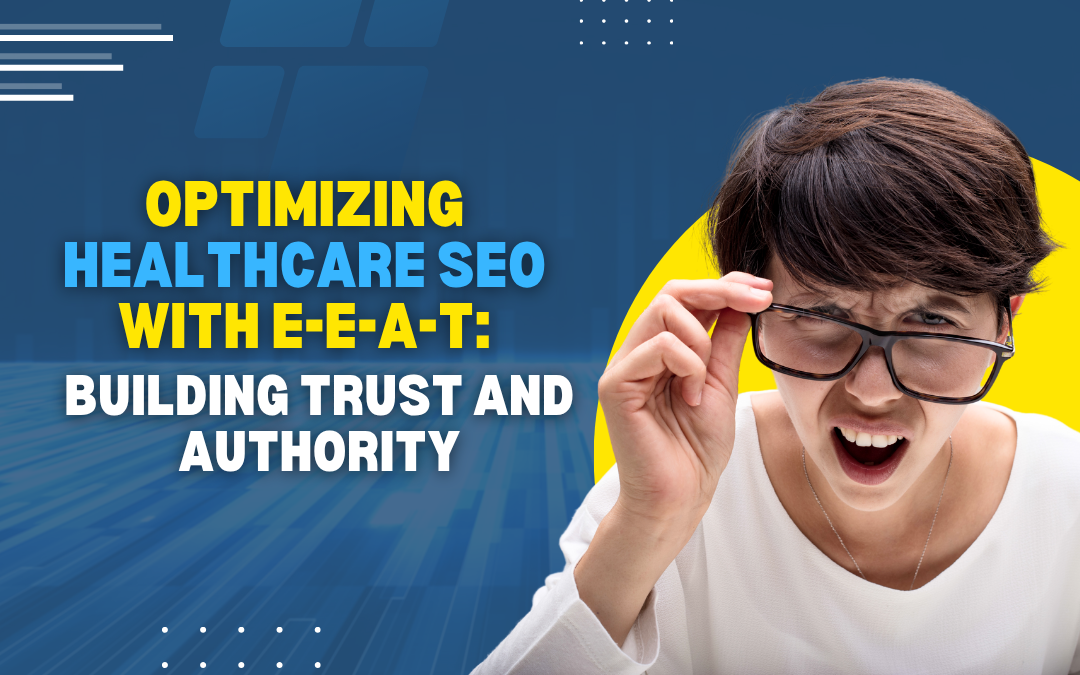In today’s digital-first world, healthcare providers can’t rely solely on word of mouth or legacy reputation. Patients are increasingly turning to search engines to evaluate clinics, hospitals, and practitioners—before ever booking an appointment. This makes healthcare SEO not just a marketing option, but a necessity. However, ranking high on Google in the medical domain requires more than just keywords and backlinks. It demands trust. That’s where the concept of Healthcare SEO with E‑E‑A‑T becomes essential for standing out online.
E-E-A-T, which stands for Experience, Expertise, Authoritativeness, and Trustworthiness, is a key concept in Google’s search quality guidelines, especially for industries like healthcare where misinformation can have serious consequences. By integrating E-E-A-T into your content strategy, your medical website can improve visibility, foster patient trust, and establish itself as a reliable digital destination.
What is E-E-A-T?
E-E-A-T is not an algorithm or a direct ranking factor, but a framework Google uses to assess the quality of content, particularly for pages that can affect a person’s health, finances, or safety. Healthcare websites naturally fall into the “Your Money or Your Life” (YMYL) category, meaning the content must meet higher standards to be considered trustworthy.
The concept breaks down into four critical elements. Experience reflects whether content is written by someone with first-hand involvement or practical exposure to the topic. Expertise emphasizes the credentials and qualifications of the content creator. Authoritativeness evaluates the reputation of the website and its contributors. And Trustworthiness measures the transparency, security, and reliability of the site. Collectively, these elements form the foundation of Healthcare SEO with E‑E‑A‑T, ensuring both visibility and trust. For healthcare professionals, excelling in each of these areas is vital for digital success.
Why E-E-A-T Matters in Healthcare SEO

The healthcare sector is unique in its sensitivity. A single piece of misleading advice could lead to real-world harm, which is why Google applies stricter scrutiny to medical content. Incorporating E-E-A-T principles not only aligns with Google’s guidelines but also helps clinics and hospitals build lasting relationships with their patients.
Recent statistics underscore this shift. Around 88% of patients research online before booking an appointment. Furthermore, content that demonstrates strong E-E-A-T signals is significantly more likely to appear on the first page of search results. This is especially true for local searches, where 72% of patient decisions are influenced by what they find online.
For Healthcare SEO with E‑E‑A‑T, these principles serve as a foundation to enhance both visibility and trust. When patients feel confident in your content, they are more likely to convert into actual visits or inquiries.
Implementing E-E-A-T in Your Healthcare Content Strategy
Implementing Healthcare SEO with E‑E‑A‑T into your digital strategy doesn’t require a complete overhaul, but it does demand consistency and intentionality. Begin with the content itself. Articles should be written or reviewed by certified medical professionals, and clearly attribute their credentials. This not only fulfills the “expertise” element but also improves the trust factor in the eyes of both users and search engines.
Content should also be written in a language that is accessible to a layperson. Avoid excessive jargon and instead focus on clear, empathetic communication that demonstrates practical understanding—a key part of the “experience” component. Keep the content fresh and regularly updated to reflect the latest in medical best practices and guidelines.
Moreover, ensure that your website includes author bios, references to authoritative medical sources, and privacy-secured features like HTTPS. Small details—such as displaying clinic addresses, phone numbers, and patient testimonials—reinforce transparency and enhance your site’s authority.
Measuring and Monitoring E-E-A-T Success
Once you’ve embedded E-E-A-T principles into your strategy, it’s crucial to track their impact. Google Search Console provides valuable insights into how your content performs—metrics such as click-through rates (CTR), impressions, and search queries offer clues about trust signals.
User behavior is another key indicator. A decrease in bounce rates and longer time spent on pages often means your content resonates with visitors. Look out for increases in branded search queries, as these imply growing recognition and authority.
Additionally, earning backlinks from respected medical organizations or being cited in major health publications can serve as a strong signal of authoritativeness. Platforms like Google Business Profile, Healthgrades, and even social media reviews offer additional data on how patients perceive your brand.
Common Mistakes to Avoid
Despite good intentions, many healthcare websites fall short on E-E-A-T due to avoidable mistakes. One common issue is publishing content without attributing it to a credible source. Anonymous articles or blog posts without professional review can erode trust, especially in the medical field.
Another pitfall is allowing content to become outdated. A blog post from three years ago might still attract traffic, but if it contains obsolete medical advice, it could damage both user confidence and search rankings. Lack of citations and poor site security (e.g., missing HTTPS) are additional factors that undermine trustworthiness.
Finally, replicating content across multiple pages without adding unique value can be detrimental. Google favors originality, particularly in the healthcare space where accuracy and context matter deeply.
Conclusion
As healthcare continues to digitize, the role of content has evolved from being merely informative to fundamentally trust-building. For clinics, hospitals, and medical professionals aiming to thrive in this space, mastering E-E-A-T SEO is not optional—it’s essential.
At ClinicSpots Digital Services, we specialize in creating data-driven, medically accurate content strategies tailored to healthcare providers. Our goal is to elevate your digital presence, not just for better rankings, but for deeper patient trust and engagement.
By aligning your content with Healthcare SEO with E‑E‑A‑T principles, you’re doing more than improving SEO—you’re building a reputation that patients and search engines can rely on.
Relatable Blogs
FAQs
What is E-E-A-T in healthcare SEO?
It stands for Experience, Expertise, Authoritativeness, and Trustworthiness—key factors that influence how Google evaluates and ranks health-related content.
Why is E-E-A-T important for medical websites?
How can I demonstrate experience and expertise in my content?
What are examples of trust signals for healthcare websites?
How does E-E-A-T affect Google rankings?
Think with Google – How Patients Search for Healthcare


